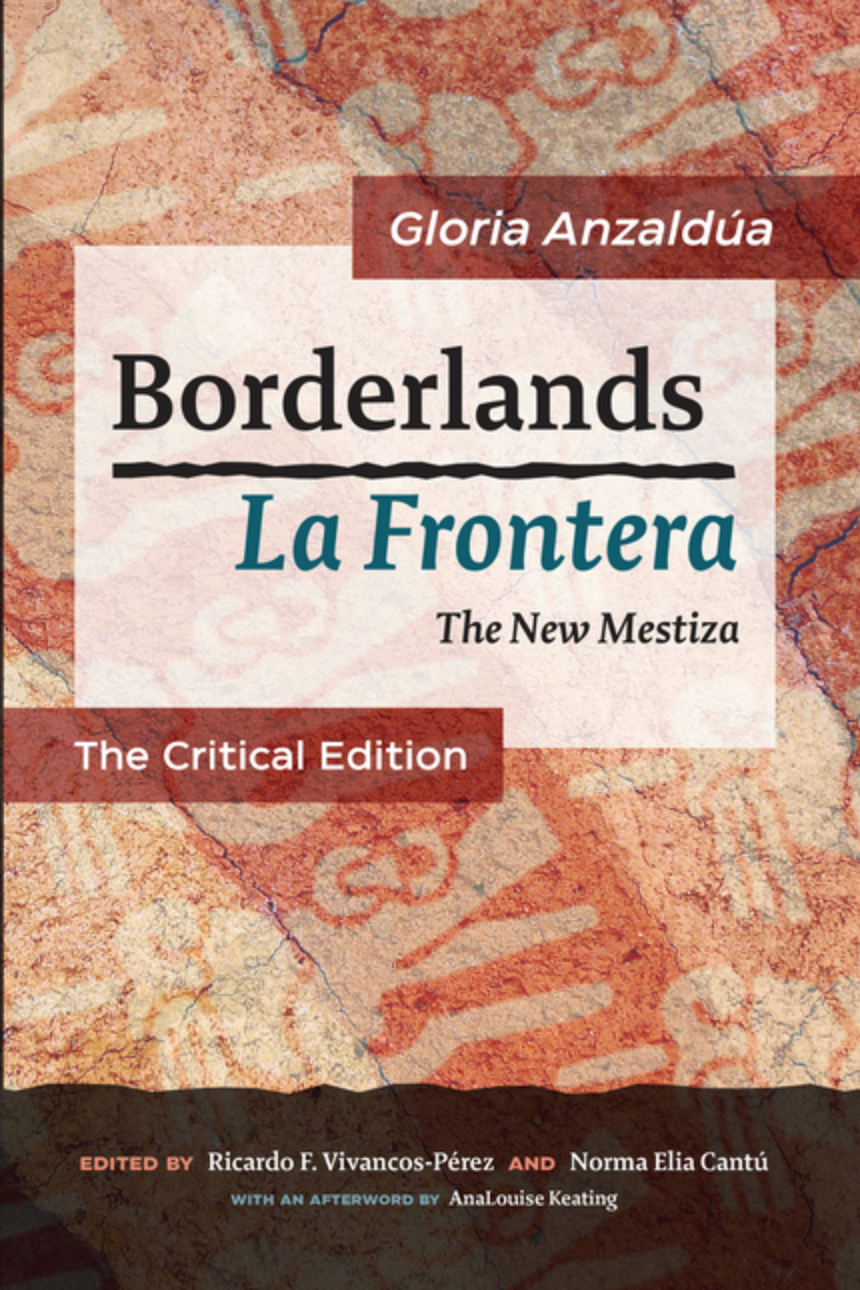Borderlands / La Frontera: The Critical Edition: The New Mestiza: The Critical Edition Aunt Lute Books
"Borderlands was first published in 1987 after an organic composition process, mixing prose and poetry and integrating personal memories with a philosophical search for a consciousness-raising and coalition-building method for the oppressed. Conceptually innovative, visionary, and rebellious at the time, Borderlands has continued to be studied as a distinctive creative work and a spiritual guidebook to heal and empower Chicanxs, queer communities of color, and other marginalized groups. Rooted in Gloria Anzaldúa's experience as a Chicana, a lesbian, an activist, and a writer, the essays and poems in Borderlands/La Frontera, her first book and signature work, remap our understanding of "borders" as psychic, social, and cultural terrains that we inhabit and that inhabit all of us.
Drawing heavily on archival research and a comprehensive literature review, this critical edition elucidates Anzaldúa's complex composition process and its centrality in the development of her philosophy and contextualizes the book within her theories and writings before and after its 1987 publication. It opens with two introductory studies; offers a corrected text, explanatory footnotes, translations, and four archival appendices; and closes with an updated bibliography of Anzaldúa's works, an extensive scholarly bibliography on Borderlands, and her biography. It also featuress features an afterword by noted Anzaldúa scholar AnaLouise Keating."
Biographical Note:
Gloria Anzaldúa was a Chicana-tejana-lesbian-feminist poet, theorist, and fiction writer from South Texas. In addition to authoring Borderlands/La Frontera: The New Mestiza (Aunt Lute, 1987), she was the editor of the critical anthology Making Face/Making Soul: Haciendo Caras (Aunt Lute, 1990) and co-editor of This Bridge Called My Back: Writings by Radical Women of Color (Persephone, 1981), winner of the Before Columbus Foundation American Book Award. Her works also include Interviews/Entrevistas (Routledge, 2000) and This Bridge We Call Home: Radical Visions for Transformation, edited with AnaLouise Keating (Routledge, 2002). She also authored three bilingual children's books, including Prietita Has a Friend/Prietita tiene un amigo. She taught Creative Writing, Chicano Studies, and Feminist Studies at University of Texas, San Francisco State University, Vermont College of Norwich University, and University of California Santa Cruz.
Gloria Anzaldúa passed away in 2004 and was honored around the world for shedding visionary light on the Chicana experience by receiving the National Association For Chicano Studies Scholar Award in 2005. Gloria was also posthumously awarded her doctoral degree in literature from the University of California Santa Cruz. A number of scholarships and book awards, including the Anzaldúa Scholar Activist Award and the Gloria E. Anzaldúa Award for Independent Scholars, are awarded in her name every year.
"Borderlands was first published in 1987 after an organic composition process, mixing prose and poetry and integrating personal memories with a philosophical search for a consciousness-raising and coalition-building method for the oppressed. Conceptually innovative, visionary, and rebellious at the time, Borderlands has continued to be studied as a distinctive creative work and a spiritual guidebook to heal and empower Chicanxs, queer communities of color, and other marginalized groups. Rooted in Gloria Anzaldúa's experience as a Chicana, a lesbian, an activist, and a writer, the essays and poems in Borderlands/La Frontera, her first book and signature work, remap our understanding of "borders" as psychic, social, and cultural terrains that we inhabit and that inhabit all of us.
Drawing heavily on archival research and a comprehensive literature review, this critical edition elucidates Anzaldúa's complex composition process and its centrality in the development of her philosophy and contextualizes the book within her theories and writings before and after its 1987 publication. It opens with two introductory studies; offers a corrected text, explanatory footnotes, translations, and four archival appendices; and closes with an updated bibliography of Anzaldúa's works, an extensive scholarly bibliography on Borderlands, and her biography. It also featuress features an afterword by noted Anzaldúa scholar AnaLouise Keating."
Biographical Note:
Gloria Anzaldúa was a Chicana-tejana-lesbian-feminist poet, theorist, and fiction writer from South Texas. In addition to authoring Borderlands/La Frontera: The New Mestiza (Aunt Lute, 1987), she was the editor of the critical anthology Making Face/Making Soul: Haciendo Caras (Aunt Lute, 1990) and co-editor of This Bridge Called My Back: Writings by Radical Women of Color (Persephone, 1981), winner of the Before Columbus Foundation American Book Award. Her works also include Interviews/Entrevistas (Routledge, 2000) and This Bridge We Call Home: Radical Visions for Transformation, edited with AnaLouise Keating (Routledge, 2002). She also authored three bilingual children's books, including Prietita Has a Friend/Prietita tiene un amigo. She taught Creative Writing, Chicano Studies, and Feminist Studies at University of Texas, San Francisco State University, Vermont College of Norwich University, and University of California Santa Cruz.
Gloria Anzaldúa passed away in 2004 and was honored around the world for shedding visionary light on the Chicana experience by receiving the National Association For Chicano Studies Scholar Award in 2005. Gloria was also posthumously awarded her doctoral degree in literature from the University of California Santa Cruz. A number of scholarships and book awards, including the Anzaldúa Scholar Activist Award and the Gloria E. Anzaldúa Award for Independent Scholars, are awarded in her name every year.
Couldn't load pickup availability
Share

You Also Viewed

Borderlands / La Frontera: The Critic...

